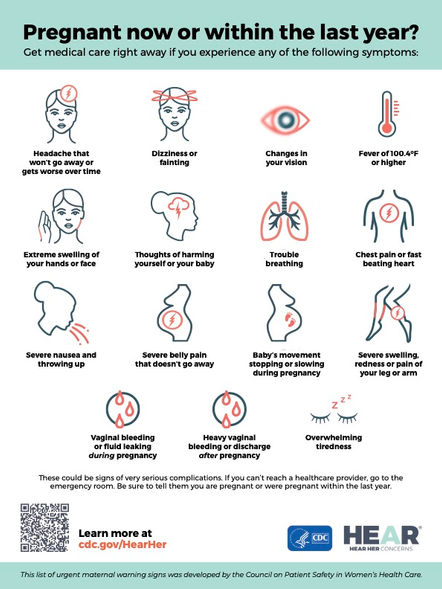
The 4th Trimester:
Care That Continues After Birth
The 4th trimester, the first 12 weeks after delivery, is just as important as pregnancy itself. Mothers need time and care to recover, while babies are learning to adjust to the world outside the womb. In the Texas Panhandle, many families face barriers to getting postpartum care, which makes this stage even more critical. Here, you’ll find resources, guidance, and support designed to help mothers heal, protect their health, and connect with local services for a stronger start.
Why the Fourth Trimester is Vulnerable
The weeks after birth can be some of the hardest for mothers and families. In the Texas Panhandle, Phase I findings showed that many women face barriers that make recovery and adjustment even more difficult:
Follow-up care is often delayed
Medicaid gaps and approval delays mean some women cannot schedule their first postpartum visit on time, putting them at higher risk for complications like high blood pressure or infection.
About 11.4% of women in our region are diagnosed with a mental health disorder during or after pregnancy — higher than many realize.
(Source: Texas Health Care Information Collection [THCIC] Inpatient Public Use Data File, 2016–2019)
Postpartum mental health struggles are common.
Breastfeeding support is limited.
While many mothers want to breastfeed, access to lactation consultants or community-based support is uneven, especially in rural counties.
(Source: TRP community assessments, 2023–2024)
Common Challenges
Physical Recovery
Every birth is different. Whether cesarean or vaginal, healing takes time. Pain, bleeding, and fatigue are common, and some women need extra support to manage complications.
Mental Health & Emotional Well-Being
Feelings of sadness, anxiety, or being overwhelmed are normal at times, but for some moms, they grow into postpartum depression or anxiety. In our region, more than 1 in 10 women face a maternal mental health disorder.
Sleep Deprivation & Energy
Newborns wake often, and the lack of rest can quickly take a toll. Tiredness affects mood, healing, and the ability to bond with your baby.
Breastfeeding & Lactation Issues
Many mothers want to breastfeed, but challenges like pain, latching problems, or lack of access to lactation consultants can make it stressful. Support makes a big difference.
Nutrition & Meal Planning
The body needs healing foods, hydration, and rest — but food insecurity and time pressures often make it hard for families to plan healthy meals after birth.
Follow-Up Care & Appointments
Timely postpartum visits are critical for blood pressure checks, mental health screening, and recovery. Yet delays in Medicaid approval or transportation barriers often mean women miss this care.
Physical Changes
Involution
The uterus gradually returns to its pre-pregnancy size (involution), which can cause cramping.
Vaginal birth recovery may include
Perineal pain and swelling and discomfort from tearing or an episiotomy
Hormonal Shifts
Particularly a drop in estrogen and progesterone, may lead to, mood changes, hair loss, and night sweats.
C-section recovery involves
Pain and tenderness around the incision as it heals
Fluctuating Energy Levels
Due to sleep deprivation and the demands of caring for a newborn
Breastfeeding mothers may experience
Engorgement, nipple soreness and mastitis (in some cases)
What Helps?
CHWs provide one-on-one postpartum follow-up, check in on recovery, and connect families with services. They also offer warm handoffs to clinics or specialists when extra care is needed.
Postpartum depression, and anxiety are common. Referrals to local mental health providers, and support groups help mothers feel less isolated and more confident.
Insurance Navigation Assistance
Many women face delays in getting coverage for postpartum visits. CHWs and clinic partners can guide families through applications, renewals, or CHIP/Medicaid navigation to make sure care isn’t missed.

The information provided on this site is intended as a resource hub to help mothers access and review important maternal health information. This is not intended to provide medical advice. Before making any health decisions, always consult with your healthcare provider to ensure it is appropriate for your individual needs.







